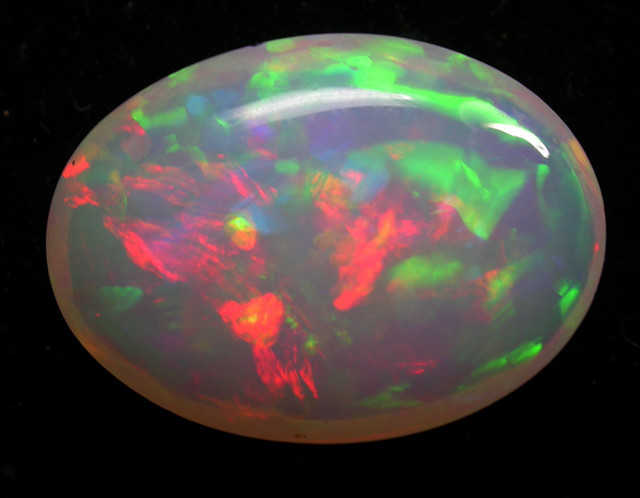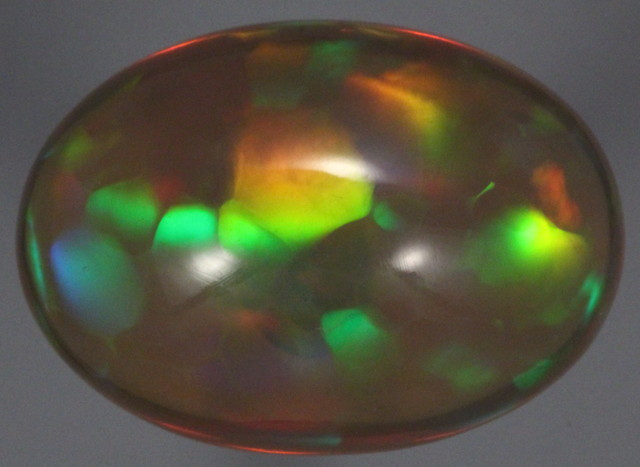
Veröffentlicht am 17th Feb 2020
Geändert am 17th Nov 2025
Sind äthiopische Opale ethisch vertretbar?
 Äthiopische Opale zählen zu den kostbarsten und begehrtesten Edelsteinen der Welt. Doch wissen Sie, was selbst die schönsten Edelsteine unattraktiv machen kann? Unethische Praktiken. Das führt uns direkt zur entscheidenden Frage: Sind äthiopische Opale ethisch vertretbar?
Äthiopische Opale zählen zu den kostbarsten und begehrtesten Edelsteinen der Welt. Doch wissen Sie, was selbst die schönsten Edelsteine unattraktiv machen kann? Unethische Praktiken. Das führt uns direkt zur entscheidenden Frage: Sind äthiopische Opale ethisch vertretbar?
Das kommt darauf an. Äthiopische Opale gelten als ethisch einwandfrei, wenn bestimmte Richtlinien eingehalten werden. Um jedoch zu verstehen, warum diese Bestimmungen existieren, wollen wir das Thema etwas genauer betrachten. Was genau versteht man unter Ethik und warum ist sie in der Edelsteinbranche so wichtig? Lesen Sie weiter, um alles Wissenswerte über ethisch einwandfreie äthiopische Opale zu erfahren.
Was bedeutet es, ethisch zu handeln?
Bevor wir uns der eigentlichen Frage widmen, ist es notwendig, zunächst zu verstehen, was ethisch bedeutet, insbesondere im Zusammenhang mit dem Opalabbau. Wie definieren wir etwas als ethisch und wie lässt sich dies auf die Ethik des Opalabbaus übertragen? Etwas ist ethisch, wenn es im Hinblick auf Richtig und Falsch als moralisch richtig gilt.
Im Hinblick auf den Opalabbau unterteilen wir die Moral in zwei Aspekte:
Werden die Opale auf eine Weise gewonnen, die die Umwelt in Äthiopien nicht negativ beeinflusst?
Sind die Bedingungen für die Minenarbeiter überhaupt sicher, um äthiopische Opale abzubauen?
Die Beantwortung dieser beiden Fragen wird uns helfen, herauszufinden, ob äthiopische Opale ethisch vertretbar sind. Beginnen wir mit den Auswirkungen des Opalabbaus auf die Umwelt. 
Damit der Opalabbau ethisch vertretbar ist, müssen die Beschaffungsrichtlinien und -vorschriften eingehalten werden. Diese dienen dem Schutz der Arbeiter und des Landes während des Abbauprozesses.
Regeln und Vorschriften für die ethische Opalbeschaffung
Äthiopien ist eines von sieben Ländern weltweit, die Opale abbauen. Die äthiopische Opalindustrie erwirtschaftet rund 25 Millionen US-Dollar. Wie Sie sich vorstellen können, ist das eine beträchtliche Summe, die die Wirtschaft Äthiopiens maßgeblich prägt. Daher stellt die äthiopische Regierung den Opalgräbern alle notwendigen Mittel zur Verfügung, um einen möglichst sicheren Abbau zu gewährleisten. Die Gesundheit, das Wohlergehen und die Sicherheit der äthiopischen Minenarbeiter haben für die Regierung höchste Priorität.
Doch die Bergbauindustrie insgesamt hat in puncto ethischer Standards – sowohl zum Schutz der Umwelt als auch zum Wohle der Bergleute – noch viel zu tun. Seit 2018 gelten in den USA Anforderungen, die angehende Bergleute erfüllen müssen, bevor sie in der Branche tätig werden dürfen. 
Als internationaler Rat setzt sich der ICMM für die Verbesserung und Wahrung ethischer Standards im Bergbau ein. Die Fokussierung auf mehr Nachhaltigkeit im Bergbau trägt zum Umweltschutz bei und ermöglicht den Mitgliedern gleichzeitig den internationalen Bezug von Opalen.
Erforderliche Dokumente für den Abbau äthiopischer Opale
Seit 2010 benötigen Bergleute in Äthiopien mindestens eine von vier Lizenzen für den Opalabbau. Dieses Gesetz soll sicherstellen, dass die Bergleute legal arbeiten und vor Betreten der äthiopischen Minen mit der notwendigen Ausrüstung ausgestattet sind. Die äthiopische Regierung verfolgte mit diesem Schritt das Ziel, die Ethik im Bergbau zu verbessern und zu wahren.
Die vier verschiedenen Lizenzen, die für den äthiopischen Opalabbau gültig sind, sind:
Eine Beibehaltungslizenz
Eine Explorationslizenz
Eine Aufklärungslizenz
Skalierte Bergbaulizenzen zur Verwendung durch Bergbaubetriebsteams
Diese Regulierungen mögen zwar positiv erscheinen, haben aber auch eine Schattenseite. Intensive staatliche Eingriffe haben den Export von Opalen extrem erschwert, was zu einem massiven Anstieg des Schmuggels geführt hat.
Wer profitiert am meisten von Opalen aus Äthiopien?
Äthiopische Opale sind sehr begehrt, da sie zwar hochwertig, aber deutlich günstiger als australische Opale sind. Auch als Welo-Opale bekannt, weisen sie dieselbe Leuchtkraft, dasselbe Farbenspiel und dieselbe Körperfarbe wie andere Opalquellen auf, sind aber preisgünstiger.
Da sie günstiger sind, erfreuen sie sich seit Mitte der 90er-Jahre großer Beliebtheit. Doch jede Nachfragesteigerung hat auch Folgen. Bei hoher Nachfrage werden Grenzen oft überschritten und ethische Grundsätze verschwimmen. Äthiopische Opale sind aufgrund ihrer Herkunft und ihres Preises häufig sehr gefragt. 
Das wirft die Frage auf: Warum sind äthiopische Opale überhaupt so günstig? Beeinträchtigt der Preisunterschied die äthiopischen Minenarbeiter? Werden die Arbeiter schlechter bezahlt, damit die Opalverkäufer mehr verdienen und die Kunden mit dem Preis zufrieden sind? Fragen zu stellen ist verständlich, besonders beim Kauf eines Produkts aus einem anderen Land. Das Gute daran ist, dass es das Bewusstsein schärft und letztendlich positive Veränderungen bewirkt. Trotzdem zögern Sie als Käufer vielleicht, etwas zu kaufen, wenn Sie nicht alle Hintergründe kennen. Verständlich! Hier erfahren Sie, was Sie beim Kauf äthiopischer Opale wissen sollten:
Wie man erkennt, ob äthiopische Opale ethisch vertretbar sind
Zusammenfassend lässt sich sagen, dass äthiopische Opale ethisch vertretbar sind, sofern die Minenunternehmen die staatlichen Vorgaben erfüllen. Doch selbst wenn ein Unternehmen behauptet, ethisch zu arbeiten, wie kann man sich der Praktiken sicher sein, die die lokalen Minenarbeiter und die Umwelt belasten? Als Käufer können Sie am besten mit Ihrem Kaufverhalten ein Zeichen setzen. Um ethischen Bergbau in Äthiopien zu unterstützen, kaufen Sie Opale von Anbietern, die detaillierte Informationen über den Abbauprozess bereitstellen können. Recherche ist in ethischen Fragen von größter Bedeutung. 
Wenn Sie auf einen außergewöhnlichen Edelstein stoßen, der viel zu günstig erscheint, sollten Sie die ethischen Hintergründe hinterfragen. Umgekehrt signalisiert die Unterstützung von Minenunternehmen, die ihre Arbeiter fair behandeln, dass Ihnen ethische Grundsätze wichtig sind. Letztendlich hat Ihr Kaufverhalten einen erheblichen Einfluss auf den Edelsteinmarkt.
Überprüfen Sie die Unternehmen, von denen Sie Edelsteine kaufen, und recherchieren Sie die Minen, aus denen sie Opale gewinnen. Stellen Sie die entscheidenden Fragen wie:
Erhalten Bergleute und Arbeiter einen fairen Lohn?
Wie sind die Arbeitsbedingungen?
Wie werden die heimische Tierwelt und ihr Lebensraum beeinträchtigt?
Welche Vorschriften gelten für den lokalen Bergbau?
Die Frage, ob äthiopische Opale ethisch vertretbar sind, lässt sich nicht einfach beantworten. Moralvorstellungen und Überzeugungen gründen sich jedoch oft auf schwierige Fragen und manchmal noch schwierigere Antworten. In einer idealen Welt wären alle Bergbauaktivitäten zweifellos und uneingeschränkt ethisch vertretbar!
Tatsächlich ist es durchaus möglich, Opale zu gewinnen, ohne die lokale Umwelt, die Gemeinden und die Minenarbeiter zu schädigen. Am besten gelingt dies, indem man ethisch einwandfreie äthiopische Opale von vertrauenswürdigen und seriösen Händlern kauft .
Äthiopischer Opal kaufen
Suche nach Opal Encyclopedia
Verwandte Auktionen
Neue Artikel
Schwarze Opale sind die begehrteste Opalart. Ihre tiefe Basis erzeugt ein regenbogenfarbenes Farbenspiel an der Oberfläche. Entdecken Sie die Verwendung, Eigenschaften, Geschichte und den Wert schwarzer Opale!
7th Dec 2025
Erfahren Sie, wie Opale bewertet werden und welche Faktoren ihren Preis beeinflussen. Von Farbe und Leuchtkraft bis hin zu Schliff und Herkunft – lernen Sie, wie die verschiedenen Opalarten bewertet werden, inklusive Preisbeispielen.
19th Jul 2023
Begeben Sie sich auf eine Reise und erfahren Sie von unserer Gastautorin Vivien Schapera von Crystal Healing Techniques mehr über die Heilkraft von Opalen!
20th May 2023
Artikelkategorien
All there is to know about Opals including Black Opals, Ethiopian Opals & Boulder Opal
14 Artikel
Check out our fascinating information and articles on all things amazing in the Opal world
41 Artikel
Opal Auctions sellers who are approved as opal Verified Sellers
4 Artikel





